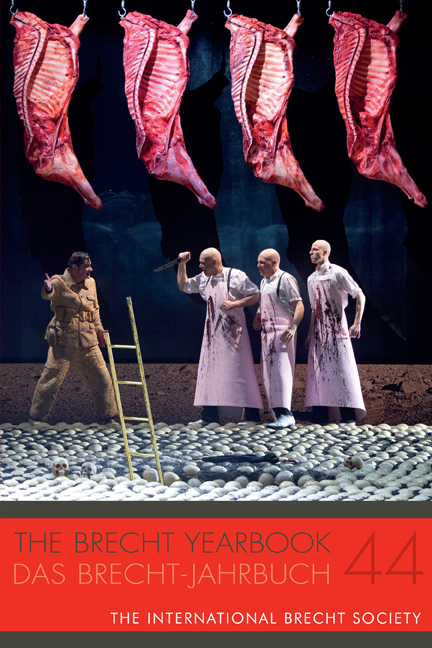Book contents
- Frontmatter
- Officers of the International Brecht Society
- Contents
- Editorial
- List of Abbreviations
- Brecht, Günter Kunert, and Edgar Lee Masters
- Brecht’s Dramatic Fragments
- Pure Joke: The Comedy of Theater since Brecht
- New Brecht Research
- Book Reviews
- Notes on the Contributors
- Now at De Gruyter Exilforschung Ein Internationales Jahrbuch
Editorial
Published online by Cambridge University Press: 09 February 2021
- Frontmatter
- Officers of the International Brecht Society
- Contents
- Editorial
- List of Abbreviations
- Brecht, Günter Kunert, and Edgar Lee Masters
- Brecht’s Dramatic Fragments
- Pure Joke: The Comedy of Theater since Brecht
- New Brecht Research
- Book Reviews
- Notes on the Contributors
- Now at De Gruyter Exilforschung Ein Internationales Jahrbuch
Summary
This volume opens with Gerrit-Jan Berendse's introduction to four typescripts that, following a hint by author Günter Kunert, were recently discovered in the German Literature Archive in Marbach. The four pages are the manuscript of Kunert's German translation of the opening poem of Edgar Lee Masters's Spoon River Anthology from 1915, “The Hill,” with handwritten corrections by Brecht. They are published here for the first time, with a transcription of Brecht's annotations by Erdmut Wizisla.
Partly inspired by the recent publication of Brecht and the Writer's Workshop: Fatzer and Other Dramatic Projects (ed. Tom Kuhn and Charlotte Ryland, London: Bloomsbury Methuen Drama, 2019), this volume includes a special section on “Brecht's Dramatic Fragments.” André Fischer argues in his essay on Fatzer (1926–30) that Brecht wasn't able to finish the play because of a political dilemma the revolutionary struggle confronted him with. Fischer contrasts the individual resistance of the protagonist Fatzer, which poses an obstacle to the Leninist revolutionary project, with the false collectivism of his rival Keuner, and tries to show that Brecht modeled the latter's idea of authoritarian leadership after the Conservative Revolution of the 1920s. In her article on Brecht's Fleischhacker (1924–29), Phoebe von Held suggests that the play's fragmentary aesthetic is not unintentional but rather results from its thematic concerns with the radicalization of the gestural, the de-montage of its source material (Frank Norris's The Pit), and the breakdown of naturalist narrative as analogous to the temporality of financial transactions. According to von Held, the play's title allegorically points to the capitalist system as a tool that continually “hacks” into, disintegrates, and sacrifices the “flesh” of the social and communal body. One fragment not included in Kuhn and Ryland's collection is Brecht's play on the biblical David that he worked on between 1919 and 1921, and that was recently translated, adapted, and staged over a two-year period at Trinity College Dublin by Nicholas E. Johnson and David Shepherd. In their contribution to this volume, Johnson and Shepherd describe the genesis and process of their extended interdisciplinary “practice-asresearch” that led to the performance of The David Fragments.
- Type
- Chapter
- Information
- The Brecht Yearbook / Das Brecht-Jahrbuch 44 , pp. ix - xiPublisher: Boydell & BrewerPrint publication year: 2019

